Topic
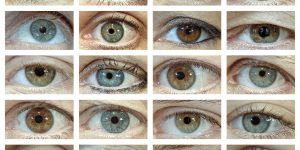
AUGENSCHEIN
Sylvia Eckermann (AT), Stieglerhaus
The Ars Electronica Garden St. Stefan ob Stainz takes us on a journey to Sylvia Eckermann’s public art project AUGENSCHEIN. AUGENSCHEIN takes the eye as a symbol for how our society relates to vision and visualisation, in its encouraging and more dangerous aspects.
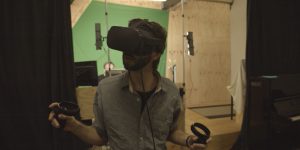
Fertile Methodologies
Tactical Space Lab (AU)
The Tactical Space Lab is a research initiative focusing on the intersection of art and technology. We are committed to expanding the diversity of stories and voices represented through new technologies via collaborative projects and educational programs across all ages, with the aim of ‘demystifying’ VR, not just for artists, but for the wider community.
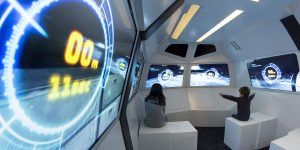
Visit the Moon with an astrophysicist!
Cité de l’espace (FR)
Come visit the Moon with French astrophysicist and co-discoverer of ice on the Moon, Sylvestre Maurice! He will guide you through the “Moon exhibition” in Cité de l’espace, the space museum in Toulouse, France. These 4 videos were made as part of the “children’s science conference” that invited pupils to imagine their schools on the Moon. Through the eyes of an astrophysicist who has dedicated his life to solar system exploration, click and discover step by step the immersive "Moon exhibition".
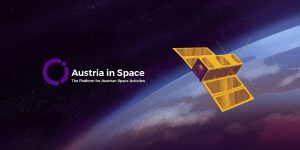
Austria in Space Garden
Austria in Space (AT)
Austria in Space is more than just another website. It is THE place for Space in Austria. At the Ars Electronica Festival, the Austria in Space initiative will present some of their program highlights and show how relevant Austrian innovations are to the global space exploration sector.
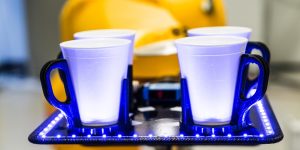
Robots in Action - fast and sensitive!
Institute of Robotics, Johannes Kepler University Linz (AT)
Robots can be strong and sensitive at the same time! They can move extremely fast but also handle fragile objects like champagne glasses. Imagine you want to carry a tray with several glasses of filled liquid without spilling –and you may even be adventurous and try to wave the tray over your head. Most of us will fail to perform such a stunt without breaking some glasses, but our robots are smart and agile enough to do just this. The Institute of Robotics at Johannes Kepler University will open its lab and showcase what modern industrial robotics are, and how fun they can be.
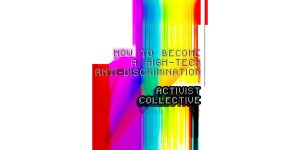
Nushin Isabelle Yazdani und Internet Teapot (Karla Zavala und Adriaan Odendaal): [d/r]econstructing AI - dreams of visionary fiction and zine-making
How to Become a High-Tech-Anti-Discrimination Activist Collective
With this workshop we investigate the structures behind algorithmic decision making systems, discuss why their design is normative, and how AI systems reinforce structural discrimination. We embark on a speculative journey and discuss how to design to create a more just world. Which artists inspire us? Which values are important to us? We want to collect our thoughts and creative outputs in a zine.

Astrid Mager und Hong Phuc Dang: How to create your own AI device with SUSI.AI - An Open Source Platform for Conversational Web
How to Become a High-Tech Anti-Discrimination Activist Collective
The workshop introduces SUSI components like SUSI’s technology stack, its wiki-like skill editor and hardware prototype; participants work together to create a simple bot, develop new skills and test them. A reflection on data bias and algorithmic discrimination invites to collectively think about creating non-discriminatory digital technologies.

Safiya Umoja Noble: Algorithms of Oppression - How Search Engines Reinforce Racism
How to Become a High-Tech Anti-Discrimination Activist Collective
The landscape of information is rapidly shifting as new demands are increasing investment in digital technologies. Yet, critical scholars continue to demonstrate how many technologies are shaped by and infused with values that are not impartial, disembodied, or lacking positionality. Technologies hold racial, gender, and class politics. In this talk, Dr. Safiya Noble will discuss her recent book, Algorithms of Oppression, and the impact of technology on the public.

Lisa Nakamura: Estranging Digital Racial Terrorism After COVID
How to Become a High-Tech Anti-Discrimination Activist Collective
This talk argues that COVID-19 forced an accelerated migration to digital networks that exposed new audiences to traumatically racist digital events as well as new openings for critique and resistance.

How to Become a High-Tech Anti-Discrimination Activist Collective
IFG-LIT (AT)
New technologies have penetrated all aspects of our lives and promise a wide range of improvements and efficiencies. Contrary to general perception, though, the algorithms on which these technologies are based are neither neutral nor do they treat everyone equally.
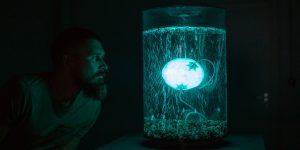
EMAP Tour
Kontejner (HR), FACT (UK), LABoral (ES)
In this tour, EMAP member organizations will give insight into their Ars Electronica Festival program and projects that address ecological issues. Many of the ecological challenges of our time will only be mastered with creative and cooperative approaches.
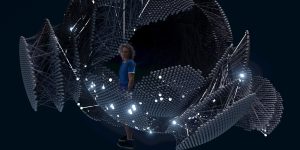
AI x Humanity - an AI LAB Tour
CPN (RS), Culture Yard (DK), Kapelica Gallery (SI)
AI x Humanity: How is AI impacting our humanity, impacted by our humanity, and what does it all mean for the future? Focusing on these aspects, the partners of the AI LAB will take you on a journey through their program.
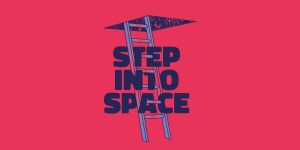
Space Art Tour – Educators Edition
Ars Electronica (AT), Ciência Viva (PT), Leiden University (NL)
Check out Space Art at the Ars Electronica Festival and get introduced to various tools for teachers and educators!

Magic Darts or, when every throw is a perfect hit
Andreas Stelzer (AT), Rudolf Scheidl (AT)
Darts is a popular game, but difficult to master. In this version of darts, players always hit the bullseye. What looks like witchcraft is revealed as a mechatronic system, with a novel microwave sensor network and ultrafast hydraulic actors interacting. Such technologies will affect our future daily life, e.g. in self driving cars, with microwaves allowin us to see in the dark, with fog or dust; or in exoskeletons, where hydraulic actuation enables ultimate compactness.
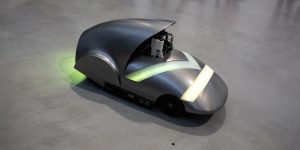
K – JKU’s Interactive Robocar
Institute for Machine Learning, LIT AI Lab, LIT Robopsychology Lab, Johannes Kepler University (AT); Inseq Design (AT)
K is a likeable little robocar: small in size, but very smart on board! Named after JKU’s famous patron, Johannes Kepler, it drives itself autonomously on changing terrain, can predict the movement patterns of pedestrians and playfully interacts with its environment.
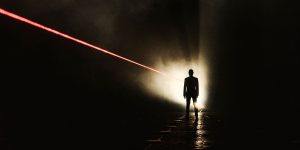
The Experimenta Garden - A Drone Opera (2015 – 2020)
Experimenta (AU)
The Experimenta Garden features the multi-platform work A Drone Opera (2015 – 2020)
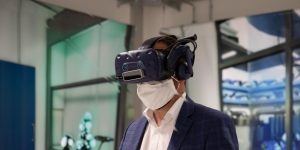
Robots Talking To Me
LIT Robopsychology Lab, Johannes Kepler University (AT)
How should robots communicate with people? What voice makes AI assistants sound trustworthy? Do we even have to listen to robots or should we always be in command ourselves? Under the title *Robots Talking to Me*, the *LIT Robopsychology Lab* presents four installations that give tangible expression to questions of human-machine relationships and invite participation.
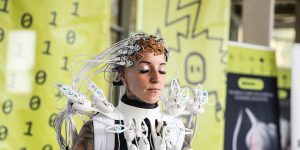
The Pangolin Scales
Thomas Faseth (AT), Harald Pretl (AT), Christoph Guger (AT), Anouk Wipprecht (NL)
The Pangolin Scales demonstrates the world’s first 1.024 channel brain-computer interface (BCI), which is able to extract information from the human brain with an unprecedented resolution to control an interactive, fashionable dress.
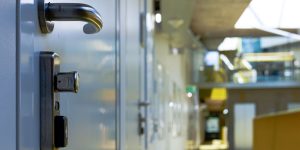
Exposed Building
Michael Roland (AT), Michael Mayr (AT), Robert Holzinger (AT), Markus Vogl (AT)
By opening a maintenance hatch and hacking into the network infrastructure behind it, we acquire access to the electronic locking system. By controlling the buzzers built into the office door locks, we transform the Science Park 2 building into an orchestra and it resounds like a huge walk-in instrument. The installation playfully provokes thought about the vulnerability of modern technology and its growing risks for society.
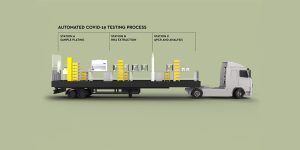
CONTAIN - Mobile COVID19 Emergency Testing Facilities
Open Cell (UK)
CONTAIN units are rapidly deployable COVID-19 testing laboratories housed in shipping containers. The design allows transportation to any location through standard shipping services. Automated RT-qPCR protocols can deliver 2,400 tests per unit in 24 hours.


